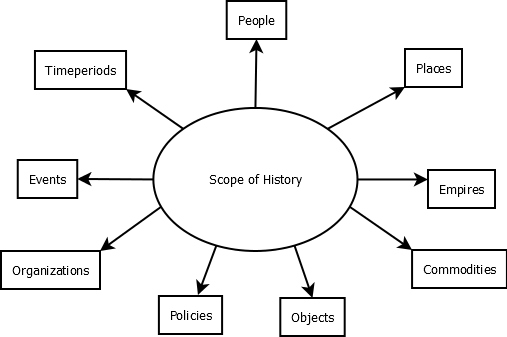
By defining history as a subject that studies past events, scope of history is all encompassing. Anything that is affecting or came into human experience could be incorporated in the scope of history. In this flow charts Scope of History, I have categorized scope of history in following nine aspects for preliminary understanding purpose only.
People: – this could be study of an individual or masses, majority of the times in this scope politicians, Kings, warriors, Thinkers, religious leaders, administrators, etc., or people sharing common socio-cultural-economic-political identities (communities) could be studied.
Places: – History of region, cities, forts, particular geographical location having historical significance, this scope of history revolves around geography and its allied aspects related to human history.
Empires: – this was or is popular scope of history, to study history by the rise and fall of empires, Mauryan, Roman, British, Maratha, Mughals and Sikhs. In this approach, other aspects of Historical studies like economy, culture, society, religion, etc., are looked through the lenses of concerned empire.
Commodities: – Certain commodities have influenced course of Human History beyond political, social and cultural boundaries, like Gold and Silver, gun powder, opium, spices, cotton. Study of these commodities gives different perspective in understanding causation in historical events.
Objects: – Specific objects, one may call them rare like Kohinoor diamond, or rare artifacts, handicrafts, objects in daily use of people can be a great source of information in understanding History. Periodization of early history sometimes identified by the source material used for making objects of daily use.
Policies: – certain policies have influenced and remained inseparable part of human history like land revenue policies, religious policies, law systems, principles of administrative policies, medical policies, Architectural policies. These are crucial source for understanding History and gives different perspective for interpretating historical processes.
Organizations: – Socio-Economic-Political organization are good ways to understand History, Trading Guilds and companies, social organizations like caste councils, political ideologies and its affiliated political parties.
Events: – One significant or crucial event containing immense power to alter the course of history and give new/different angle to look at historical event. Like battles, declarations, processions, struggles. For example, battle of Plassey, declaration of Independence, Dandi March. These are examples of some events as a scope of History.
Time periods: – history is categorized in different time periods by various historians as per their concerns and convenience, some of the well known are, Pre-History, Proto-History, History, Ancient, Medieval, Modern History, and Some are identified by dominant metal in that period like Bronze and Iron Age, then Lithic age, feudal age, age of enlightenment, digital age, Internet age. These are some examples of framing history in particular time period by dominant metal or occupation or technology.
Above mentioned 9 points are introductory in nature for understanding flow charts scope of History.